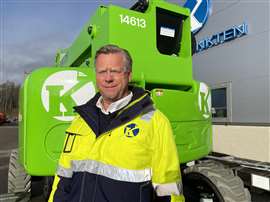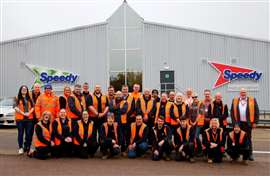Solar panels and wild flower gardens: How rental depots are becoming greener
20 May 2024
With companies under pressure to reduce their own carbon emissions and seeking to position themselves as eco-friendly, plant hire firms are competing with each other to open more energy efficient depots. Lucy Barnard takes a look at some of the greenest new store openings.
In a quiet suburb of the city of Luleå in Swedish Lapland, workers are putting the finishing touches to a new depot for access equipment rental specialist Kranpunkten.
Even though the city, which lies just 150 kilometers from the Arctic Circle experiences just three hours of daylight on average during the winter months, Thomas Eriksson, regional manager for Kranpunkten Nord points to the places where solar panels are to be installed.
In the summer months the city experiences just four hours of darkness, allowing the new solar panels to feed into the multiple EV and machinery charging stations.
 Thomas Eriksson, Regional Manager, Kranpunkten Nord. Photo: Kranunkten
Thomas Eriksson, Regional Manager, Kranpunkten Nord. Photo: Kranunkten
For Kranpunkten, which specializes in aerial platforms, telehandlers and other lifting equipment which it rents throughout Sweden and other Nordic markets, the new 414 sq m Luleå depot - the 35-year-old company’s ninth overall - is not only a strong statement about its commitment to reducing carbon emissions but also a signal to the market about the company’s wider aspirations and strategy.
The company, which aims to be ‘climate neutral’ by 2030, estimates that just by fitting its existing depots with solar panels where possible Kranpunkten has been able to reduce its power usage by 35% over the past five years.
Charging stations are becoming standard across Kranpunten’s other eight depots and are being used to fuel, not only the company’s 3,740 electric or hybrid machines (85% of the total fleet) but also the fleet of white electric trucks which the company uses to deliver its equipment.
Gesturing out of the city to the distant trees that represent Sweden’s vast northern lands, Eriksson says that the new facility will enable the company to transport equipment to a growing number of customers in Sweden’s far north region of Norbotten of which Luleå is the capital, as well as neighbouring Västerbotten using its electric trucks.
“Our new strategically placed depot in Luleå enables us to provide environmentally friendly machinery locally in Norrland,” he says. “Our Luleå depot will work with electric transportation to customers just like our other regions.”
North Sweden’s green industry boom
For Kranpunkten the decision to open a new depot in the country’s far north region, is not just a way to cut the costs and carbon associated with delivering construction equipment across Sweden’s vast open spaces, but also part of a clear strategy to participate in the region’s green industry boom.
Certainly, Northern Sweden’s plentiful supply of cheap hydro and wind renewable electricity, coupled with a supply of raw materials and affordable land prices are prompting a ‘green’ industry boom in Sweden’s far north.
Long home to polluting industries, the Norbotten and Västerbotten regions are at the centre of an eco-boom attracting industries including battery manufacturing, data centres and low carbon steel which Sweden’s government estimates to be worth around US$120bn.
Last month, Swedish steel producer SSAB announced it would be building a 2.5 million tonne capacity fossil-free steel mill in the city, supplied with fossil free sponge iron from the Hybrit plant in nearby Gällivare. In January, steel company H2 Green Steel announced it had secured US$4.4bn in debt financing to build the world’s first large scale green steel plant in Boden, to the northwest of Luleå. And also in January Swedish battery producer Northvolt announced it had raised US$5bn in debt financing to help it expand its gigafactory in Skellefteå in Västerbotten.
And the creation of thousands of new jobs in the region is in turn prompting a need for new homes, shops and roads, which is again increasing demand for low carbon construction equipment.
“We have been following the development in the northern market for many years and see that there is room for a niche player like us,” Eriksson adds. “With the market’s focus on sustainable development, we are well-positioned for expansion northwards. Our focus will be on making electric and hybrid-powered units available from the fleet as needed.”
Showcasing green credentials
Kranpunkten is one of a growing number of rental companies around the world using their depots as a way of helping to meet ambitious climate goals and showcasing green credentials in the hope of winning new business.
European rental giant Loxam says that it is fitting solar panels on the roofs of every new branch it opens in the Netherlands. Meanwhile Boels Group says that around 70% of German depots and 60% of Dutch depots have been switched to more efficient LED lighting.
In the UK, equipment rental company Speedy Hire has gone one step further at its Milton Keynes depot which the company opened in 2021.
The 40,000 sq ft warehouse is in fact powered by 670 solar panels which can be seen in long grey strips on the building’s roof.
Inside the depot uses energy-efficient lighting and climate control technology to keep power use to a minimum. As a result, the company says that in the last financial year overall its 286kW solar photovoltaic system produced more energy than it needed, exporting the remainder back to the national grid.
Like Kranpunkten, Speedy too is attempting to transition to low emission delivery vehicles and is using the power generated by the depot to fuel a fleet of electric vans and battery powered electric trucks. The company says that all of the commercial vehicles operating out of the Milton Keynes depot are either electric or fuelled by HVO.
 Speedy Hire’s Milton Keynes Innovation Centre. Photo: Speedy Hire
Speedy Hire’s Milton Keynes Innovation Centre. Photo: Speedy Hire
And that’s not all. Outside the facility, the company has left part of the footprint undeveloped to form a wellbeing and wildflower garden, complete with beehives and hanging baskets repurposed from blue Speedy-branded hard hats next to an 18 meter ‘living wall’ of bushes and shrubs.
Speedy, which specializes in renting out equipment to both the retail and trade markets, says that it is using as a blueprint for all new and refurbished branches as part of its push towards halving direct emissions by 2030.
The new depot lies just 15 miles from the new HS2 Infrastructure Maintenance Depot and is designed to provide low and zero-emissions alternatives for contractors building the megaproject who are required to adhere to strict carbon management standards.
In 2023, Speedy opened a second ‘sustainable service centre’ to showcase its low carbon offering in the north of the country. And later that year Speedy opened a third depot based around the same designs in Basildon in Essex to serve London and the Southeast.
The company is also working with Thames Clippers to trial moving equipment to central London by electric boat.
“The opening of our new sustainable service centres demonstrates our continued commitment to carbon emissions reduction in the supply chain,” says Daniel Rice, managing director East. “This is a strategic location for the business and, as a modern logistical and operational centre, it supports Speedy Hire’s near-term sustainability targets while reducing energy consumption in our drive to be net zero by 2040.”
And the strategy seems to be working. According to Speedy Hire’s latest carbon reduction plan, the company has succeeded in almost halving its carbon emissions over the past three years as overall UK emissions (exclusing some scope 3) fell from 24,968 tCO2e in the year to 2020 to 13,397 during the same period in 2023.
Moreover, the company’s strategy of consolidating its operations from lots of smaller depots to fewer larger more energy efficient, low carbon ones is playing a key part in the firm’s ‘Velocity’ turnaround strategy.
Company accounts show that an operational review by the firm’s new management team in 2023 resulted in a net reduction of 20 depots over the previous year with annual cost savings estimated to be around £5 million. The company’s headcount also decreased to 3,375 in 2023 from 3,554 in March 2022.
But Jeff Eisenberg, a consultant at Claremont Consulting which advises plant hire firms on corporate strategy says that although some firms like Speedy Hire are opting for fewer, larger, more efficient depots, others continue to favour operating through a larger network of smaller, more local depots, which has the benefit of reducing carbon miles and transport expenses.
“Larger depots can be more efficient due to the concentration of personnel, expertise, and equipment, leading to higher utilization rates,” he says. “However, customers generally prefer local suppliers for faster response times and lower transport costs. If equipment is housed at a distant depot, rental companies typically can only charge for transport from the nearest depot to the customer site, which can lead to significant expenses and carbon emissions due to inter-depot transportation. Having fewer depots might reduce these inter-depot movements but may not fully address the need for localized service.”
“Strategically, rental companies often oscillate between these two models over multi-year cycles,” Eisenberg adds. “Local depots can attract higher rental rates and offer shorter transport times, appealing to customers and boosting local business. However, as operating costs rise and equipment utilization potentially decreases, companies may consolidate into fewer, larger depots to keep overhead costs down, despite the potential increase in transport expenses. Environmentally, the larger depot model is often greener due to reduced inter-depot transportation, yet the financial allure of higher rental rates from local depots remains strong.”
STAY CONNECTED



Receive the information you need when you need it through our world-leading magazines, newsletters and daily briefings.
CONNECT WITH THE TEAM












